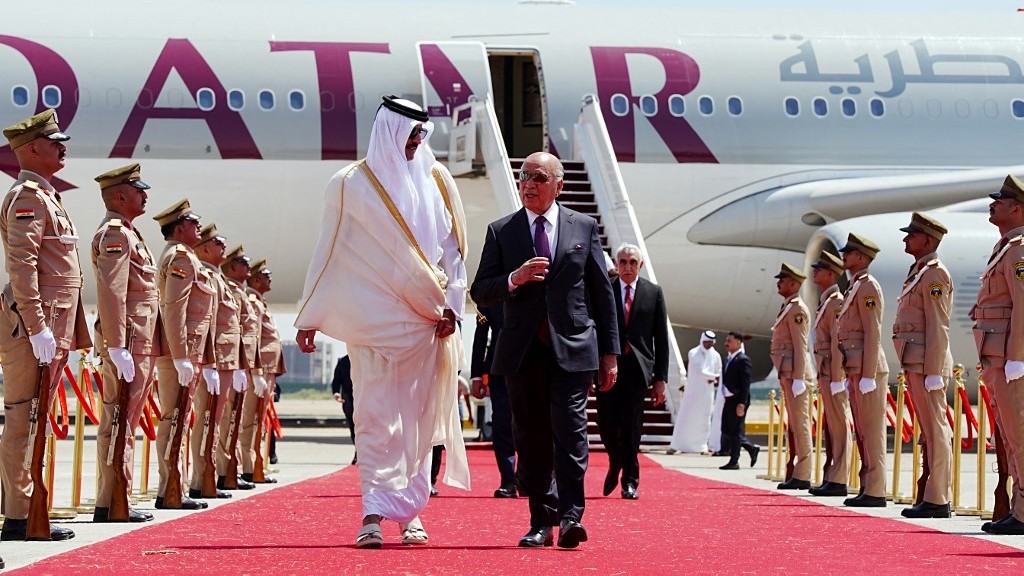Syrian president skips Arab League summit in Baghdad following opposition

A summit of the Arab League began in Baghdad on Saturday, with Syria's president absent following Iraqi outcry.
Palestinian Authority (PA) President Mahmoud Abbas was the first Arab leader to arrive in Baghdad on Friday, followed by Egyptian President Abdel Fattah el-Sisi and Qatari Emir Tamim bin Hamad Al Thani on Saturday.
However, a diplomatic source told AFP that most Gulf leaders would not be attending.
Other figures present in Baghdad on Saturday include United Nations Secretary-General Antonio Guterres and Spanish Prime Minister Pedro Sanchez.
The summit is expected to discuss the numerous crises afflicting the region, including Israel's ongoing attack on the Gaza Strip.
New MEE newsletter: Jerusalem Dispatch
Sign up to get the latest insights and analysis on Israel-Palestine, alongside Turkey Unpacked and other MEE newsletters
US President Donald Trump, who has been touring the Gulf states, sparked outrage in the Arab world earlier this year when he declared his country would take control of Gaza and turn it into the "Riviera of the Middle East".
In response, Arab leaders announced the development of a post-war plan at the previous summit in Cairo in March to rebuild the territory.
The Iraqi government has said this month's summit would endorse the plan, which calls for a $53bn fund to finance Gaza's reconstruction over five years. Under the proposal, the territory would be administered during a transitional period by a committee of Palestinian technocrats, before the PA regains control.
"We are not just rebuilding Iraq, we are also reshaping the Middle East through a balanced foreign policy, wise leadership, development initiatives, and strategic partnerships," Prime Minister Mohammed Shia al-Sudani wrote in an opinion piece earlier this month.
Syria controversy
Iraq is still trying to stabilise after years of violence sparked off by the US-led invasion in 2003 that overthrew long-time ruler Saddam Hussein.
Controversy had swirled around an invitation extended by Sudani to Syrian President Ahmed al-Sharaa, who came to power after overthrowing Bashar al-Assad in December.
Numerous Iraqi politicians had called for him to be blocked from attending over his past membership in al-Qaeda in Iraq, a group responsible for the deaths of thousands of Iraqis during the 2000s through often indiscriminate and sectarian attacks.
On Saturday, it was reported that Foreign Minister Asaad al-Shaibani, who was also a member of Syria's al-Qaeda wing alongside Sharaa, would be attending the summit rather than the president.
Iraqi media reported last month that at least 50 MPs from Asaib Ahl al-Haq and Kataeb Hezbollah - two Iran-backed armed political factions that provided military support to Assad against Sharaa and other Syrian opposition groups - had filed criminal complaints in Iraqi courts against the Syrian president.
The Islamic Dawa Party, which held the prime ministership during the bulk of the al-Qaeda insurgency, also warned against inviting Sharaa to Iraq.
Though they did not mention the prime minister by name, they said that anyone invited to the Arab League conference should have a "spotless" legal record, both at home and abroad.
However, Sudani - like several other Arab leaders - has been keen to normalise ties with Syria following 13 years of civil war that have destabilised the wider region, including fuelling the rise of the Islamic State group in Iraq.
The summit also comes shortly after Sharaa met with Trump, who announced the lifting of sanctions imposed on Syria during the Assad era.
Still, not everyone has been so open to mending relations with Iraq's western neighbour.
Safaa Rashid, a Baghdad resident who lost three cousins in al-Qaeda blasts in 2005, told Middle East Eye last month that he was appalled by Sudani's decision to invite Sharaa.
"[Sharaa] is the face of terrorism," he said.
"He must be held accountable. I lost three cousins to his group’s violence... How can someone like this be welcomed as if he were an honoured guest?"
middleeasteye.net